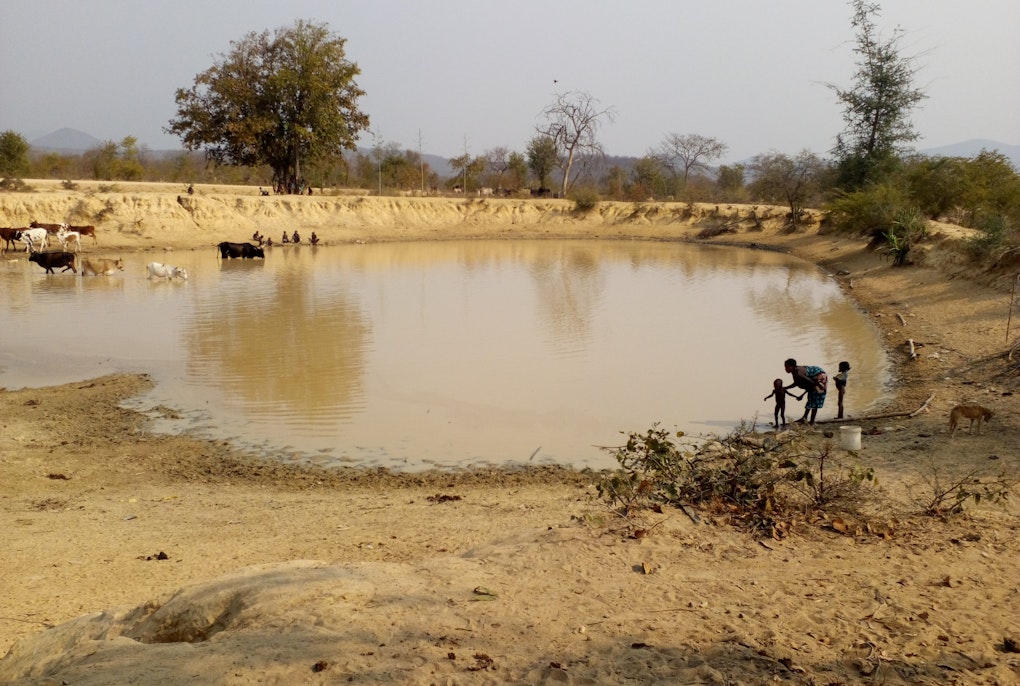magazine_ Interview
“70 percent are afraid of the negative consequences of climate change”
For the first time, the phenomenon of climate anxiety was addressed in a study for South Tyrol. Felix Windegger and Christoph Kircher talk about the results
What emotions do the effects of the climate crisis and the current political coping strategies trigger in people? Can climate anxiety be identified in South Tyrol? And what differences in emotional response are there between different social groups? The Eurac Research Center for Advanced Studies and the Provincial Institute for Statistics ASTAT carried out a survey on feelings and attitudes in relation to the climate crisis. Socio-economist Felix Windegger and sociologist Christoph Kircher are the authors of the study.
Mr. Windegger, Mr. Kircher, why is it important to research how people feel in connection to the climate crisis?
Felix Windegger: Emotions play such an important role in the climate crisis because the effects are being felt more and more, both globally and in South Tyrol – in the here and now. At the same time, it is becoming increasingly difficult to achieve the climate targets. People are seeing with their own eyes that climate change is happening. Accordingly, there are also emotional reactions. This raises the question of what this does to people and how they deal with it.
Christoph Kircher: We spent a lot of time looking at existing surveys on the subject of climate change beforehand and found that they contain very abstract and technical questions, for example on CO2 reduction or future developments. The fact is that very few respondents have deeper knowledge on these topics and usually just repeat what they have heard from the media or from others. In our study, we assume that knowledge and action are two separate levels. Although there is a lot of talk about the need to curb climate change, too little is done in practice. What actually influences actions are always emotions: how people perceive things emotionally, how they feel about the world and how they react to it, so we decided to conduct a more detailed study on this.
Few are satisfied with the current climate protection efforts; a sense of powerlessness prevails
"It is necessary to consider social and economic cushioning mechanisms from the outset when taking concrete measures."
Felix Windegger
So how does the climate crisis feel for South Tyroleans?
Windegger: The results show strong emotional reactions, with negative feelings clearly predominating. These range from concern about the direct effects that can already be felt, to fear of the future consequences, to frustration and powerlessness in the face of the current measures to contain the climate crisis. Only 28 percent are satisfied with current efforts. 80 percent of those surveyed stated that they are concerned about climate change and its consequences. Extreme weather events such as drought and water shortages, as well as heavy rainfall and flooding, were rated as particularly worrying. 70 percent stated that the possible consequences of climate change frighten them and almost 40 percent of South Tyroleans feel guilty because they feel they could or should do more to protect the climate. Fear and guilt are also much-discussed emotions in an international context. These feelings in turn lead to considerable emotional stress, which will probably also play a role in the future alongside the direct physical effects of climate change. Initiatives such as “Psychologists for Future” and “Psychotherapists for Future” are now specifically addressing these aspects.
People are particularly concerned about drought and water scarcity, as well as heavy rain and flooding
"In our study, we found that climate change is perceived very differently by different social groups."
Christoph Kircher
Can these negative feelings also motivate people to take concrete action more quickly?
Windegger: Yes, there are studies on emotions and climate change that point to this. Negative emotions, such as anger or annoyance, can certainly translate into more political commitment or changes in behavior in the private sphere. It becomes difficult with feelings of powerlessness when people resign themselves and have the feeling that they can no longer change anything anyway.
Kircher: The data shows that there are two ways of dealing with these feelings. On the one hand, there are people who react with frustration. Then, there are those who are optimistic about the future and have high hopes for technological innovations and solutions in climate policy, despite their great concern and serious engagement with the issue. In our study, we found that climate change is perceived very differently by different social groups. To paint a more differentiated picture and reveal possible tensions, we divided the respondents with similar attitudes into three groups: the concerned, the distrustful and the relaxed.
What differences did you find between the groups?
Kircher: In the concerned group: 39 percent of the respondents, worry and fear were particularly pronounced. With regard to the measures taken so far to curb climate change, these people stated that they felt particularly angry, frustrated, and powerless. The respondents attributable to the group of the relaxed – 36 percent, were satisfied with the efforts made and have high hopes that the climate crisis will be overcome. Their confidence is primarily focused on a technological solution. 25 percent of respondents could be classified as distrustful. Although they do not deny climate change, they regard it as a secondary problem. Regulations and appeals for more climate-conscious action were strictly rejected by this group, and climate protests are most frequently classified as inappropriate and exaggerated. We not only found interesting differences according to gender and educational status, but also with regard to economic and democratic attitudes. There are more women among those concerned. Men and people with a secondary or vocational school degree can be assigned more frequently to the group of the distrustful.
The negative consequences of climate change are unevenly distributed
Were there any results that particularly surprised you?
Windegger: What was really exciting and probably unique for South Tyrol are the differences in terms of language groups. People with Italian as their mother tongue are more likely to be found in the relaxed group, while people with German as their mother tongue are more likely to be found in the distrustful and concerned group.
Kircher: We assume that this is related to the climate change debate in German-speaking countries, which is more intense there. In our opinion, the native language and the associated media publicity are the determining factors for the different emotional reactions, not the place of residence or other socio-demographic characteristics.
Windegger: We also found differences compared to the 2022 study we did with ASTAT. When asked about the three most important challenges this time, climate change was still at the top of the rankings. However, we saw a significant increase of 12 and 10 percentage points respectively compared to 2022 for the topics of immigration and migration and, public safety. This shows these other social problems were obviously at the forefront in 2023, which is probably also related to the discussions in the run-up to the elections.
What do these findings mean in concrete terms for South Tyrol?
Windegger: The results make it clear that it is no longer a question of whether climate change exists at all or whether it is man-made. It’s about how we should deal with it socially and politically – and at this point the positions of the three groups differed considerably.
Kircher: There are those who are relaxed and concerned, who are prepared to adapt their lifestyle and respond positively to calls for sustainable action. On the other hand, there are the distrustful, who show strong resentment towards those who propagate a change in behavior or a sustainable lifestyle. This attitude is accompanied by strong negative emotions. Some people isolate themselves and are no longer receptive to fact-based political measures as they associate them with an agenda they want nothing to do with. Anyone planning political measures must bear in mind that there are major tensions between population groups.
"How we want to live as a society is a political question that should be negotiated socially and not scientifically."
Felix Windegger
The study concludes that as many as 56 percent doubt that there can be a democratic solution to the climate crisis. How should this figure be interpreted?
Kircher: Yes, 56 percent stated that they would temporarily suspend democratic procedures – at least in exceptional cases, in order to make faster progress on climate protection. Only a third were against this in all cases. These results show that the population has little confidence in the ability of politicians to counter the rapid changes in a conscious and timely manner. The population is well aware that warnings are increasing, but that concrete measures are being rolled back again and again. We have also found that satisfaction with climate policy is closely linked to general satisfaction with democracy.
Windegger: Another explanation for this result, which may seem paradoxical at first glance, could be a lack of opportunities for participation. Citizens are hardly involved in decision-making processes. If discussions take place behind closed doors but are not followed by action, the impression can arise that the system is too slow to react adequately. There are people who fundamentally question the legitimacy of democracy in climate issues – because of its inertia, because of the influence of lobbies, because of sluggish decision-making processes. However, it must also be clearly stated here that the eco-authoritarian ideas put forward by some are problematic in many respects and in no way guarantee more climate protection – the empirical data tends to indicate the opposite. And then there are those who say that all climate policy interventions are authoritarian and should therefore be rejected.
Greater consideration of social justice in climate change issues is needed
But what about other prohibitions and regulations, like the obligation to wear a seatbelt when driving. Why do people react so strongly to climate policy issues in particular?
Kircher: It really is a highly emotional topic. The fact that climate policy and questions of democracy are so often discussed together is also due to the fact that climate change has primarily been defined scientifically. Scientists make it visible through scenarios and models, but for many it remains difficult to grasp and cannot be experienced personally. Although awareness of climate change and its effects has now reached society, the proposed solutions continue to come from science. Put simply, the perception is often like this: science defines the problem, offers proposed solutions, while politics seems too inefficient to implement them. As a result, people get the impression that it is better to follow the experts directly on important issues and leave politics out of the equation. However, this argument follows a very problematic post-political logic. Science can recommend reducing CO2 emissions, but it is the task of politics to design and implement measures in a socially just way.
Windegger: How we want to live as a society is a political question that should be negotiated socially and not scientifically.
Climate impacts: three societal groups
You talk about social responsibility. In your study, you also surveyed the awareness of the South Tyrolean population about social justice in climate policy issues. How sensitive are South Tyroleans to issues of justice?
Windegger: We certainly did find a high level of sensitivity to issues of justice. 60 percent assume that people will be affected unequally by the consequences of climate change, with place of residence and socio-economic aspects cited as the most common factors. For 65 percent, social justice should be given greater consideration in climate change issues. As far as the costs of climate change are concerned, 47 percent of respondents stated that those who contribute most to the problem should be responsible according to the polluter pays principle. Only very few are of the opinion that those most affected by the consequences should also pay for most of the costs caused. Interestingly, around 20 percent said that climate change has nothing to do with justice and inequality.
Kircher: And that brings us back to the sociological perspective. Because these 20 percent do not see social justice as unimportant, quite the opposite. But, they are afraid that their concerns will be overshadowed by climate policy considerations and pushed into the background. When it comes to democratic processes, it is the distrustful respondents who are the least satisfied. They state that they hardly feel politically effective.
"An ambitious, consistent and above all participatory climate policy is necessary to revitalize democracy and strengthen trust in it."
Christoph Kircher
Socio-political differences among the three groups: The question of democracy
How could these fears be counteracted, and the feeling of self-efficacy strengthened?
Kircher: One measure could be the establishment of a climate council. One already exists in South Tyrol. The first results which reveals the council’s recommendations to politicians are to be presented soon. Our study shows that there is no getting around discussing climate issues in terms of democratic politics. An ambitious, consistent and above all participatory climate policy is necessary to revitalize democracy and strengthen trust in it. A climate council is about inviting people from civil society and putting a problem up for discussion. Experts are brought in to share their knowledge of the problem and propose different solutions. The Climate Council then discusses the direction it would like to take. The combination of scientific input and civil society discussion can then be used to formulate guidelines for policy-makers.
Windegger: In order to really involve all groups, however, organizational skills will be required. It is necessary to actively approach people and consider social and economic cushioning mechanisms from the outset when taking concrete measures.
 technical documentation
technical documentationThe survey - background and methodology
The population survey on the topic “This is how South Tyrol thinks: emotions and inequalities in the climate crisis” is a cooperation between Eurac Research and the Provincial Institute for Statistics ASTAT. In summer 2023, 1,028 South Tyroleans were asked about their feelings and attitudes towards the climate crisis and current coping strategies. The survey was conducted on the basis of a probabilistic random sample and therefore allows conclusions to be drawn about the population as a whole. This is the second collaboration between Eurac Research and the ASTAT Provincial Institute for Statistics as part of the ASTAT panel “This is how South Tyrol thinks”. The detailed results of the study are available for download in German and Italian:
 technical documentation
technical documentation








